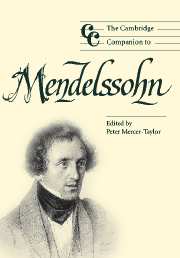Book contents
4 - Mendelssohn and the rise of musical historicism
from Part II - Situating the compositions
Published online by Cambridge University Press: 28 September 2011
Summary
The relation between Mendelssohn's works and the music of the past has preoccupied musicians, critics, and scholars since their first performances. During his lifetime, the view emerged that Mendelssohn's engagement with early music was a defining aspect of his creativity, and confronting this facet of his activities remains central to understanding his works and their significance. Successive generations have, of course, responded in different ways to Mendelssohn's compositional historicism, yet for much of the period from the 1840s to the 1960s it provided a focus for negative assessments of his output: even today, some scholars – disconcerted by the sheer extent of the composer's investment in the past – represent his responses to earlier music as fabricated musical kitsch. In general, however, our post-modern sensibilities are more sympathetic to Mendelssohn's achievement. There is, after all, an essential kinship between his concerns and our own (ironically, the current enthusiasm for his choral works was stimulated by a distinctively postmodern form of historicism, historically informed performance). Indeed, it could be claimed that, in this regard, Mendelssohn was the first composer of modernity: the first musician to wrestle with the dilemma of being dispossessed of a lingua franca.
- Type
- Chapter
- Information
- The Cambridge Companion to Mendelssohn , pp. 53 - 70Publisher: Cambridge University PressPrint publication year: 2004
- 1
- Cited by

